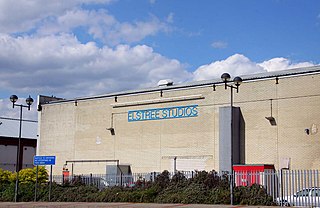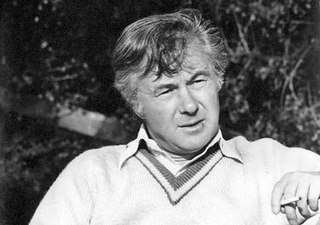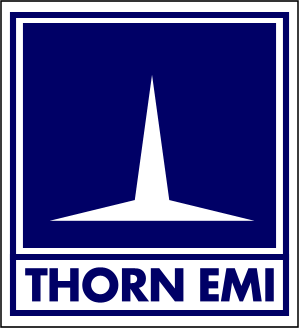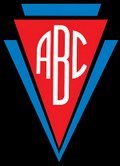Related Research Articles

EMI Group Limited was a British transnational conglomerate founded in March 1931 in London. At the time of its acquisition by Universal Music in 2012, it was the fourth largest business group and record label conglomerate in the music industry, and was one of the "Big Five" record companies. Its labels included EMI Records, Parlophone, Virgin Records, and Capitol Records, which are now referenced under Universal Music due to their acquisition with the exception of Parlophone, as it is now owned by Warner Music.

Elstree Studios is a generic term which can refer to several current and demolished British film studios and television studios based in or around the town of Borehamwood and village of Elstree in Hertfordshire, England. Production studios have been located in the area since 1914 when film production began there.

The Cannon Group, Inc. was an American group of companies, including Cannon Films, which produced films from 1967 to 1994. The extensive group also owned, amongst others, a large international cinema chain and a video film company that invested heavily in the video market, buying the international video rights to several classic film libraries. Some of their best known films include Joe (1970), Runaway Train (1985) and Street Smart (1987), all of which were Oscar-nominated.

Bryan Forbes CBE was an English film director, screenwriter, film producer, actor and novelist described as a "Renaissance man" and "one of the most important figures in the British film industry".

Thorn EMI was a major British company involved in consumer electronics, music, defence and retail. Created in October 1979, when Thorn Electrical Industries merged with EMI, it was listed on the London Stock Exchange and was once a constituent of the FTSE 100 Index. It demerged back to separate companies in 1996.
Michael Deeley is an Academy Award-winning British film producer known for such motion pictures as The Italian Job (1969), The Deer Hunter (1978), and Blade Runner (1982). He is also a founding member and Honorary President of British Screen Forum.

The Incorporated Television Company (ITC), or ITC Entertainment as it was referred to in the United States, was a British company involved in production and distribution of television programmes.
MGM-British was a subsidiary of Metro-Goldwyn-Mayer initially established at Denham Film Studios in 1936. It was in limbo during the Second World War; however, following the end of hostilities, a facility was acquired in Borehamwood, which remained in use until it was closed in 1970.

Bernard Delfont, Baron Delfont was a leading Russian-born British theatrical impresario.

Associated British Picture Corporation (ABPC), originally British International Pictures (BIP), was a British film production, distribution and exhibition company active from 1927 until 1970 when it was absorbed into EMI. ABPC also owned approximately 500 cinemas in Britain by 1943, and in the 1950s and 60s owned a station on the ITV television network. The studio was partly owned by Warner Bros. from about 1940 until 1969; the American company also owned a stake in ABPC's distribution arm, Warner-Pathé, from 1958. It formed one half of a vertically integrated film industry duopoly in Britain with the Rank Organisation.

Anglo-Amalgamated Productions was a British film production company, run by Nat Cohen and Stuart Levy, which operated from 1945 until roughly 1971. Low-budget and second features, often produced at Merton Park Studios, formed much of its output. It was the UK distributor of many films produced by American International Pictures (AIP), who distributed AA's films in the United States.
Nat Cohen was a British film producer and executive. For over four decades he was one of the most significant figures in the British film industry, particularly in his capacity as head of Anglo-Amalgamated and EMI Films; he helped finance the first Carry On movies and early work of filmmakers such as Ken Loach, John Schlesinger, Alan Parker and David Puttnam. In the early 1970s while head of EMI Films he was called the most powerful man in the British film industry. He's been called "an unsung giant of British film who never got his due from the establishment in part because of anti-Semitism... the ability to be a successful studio head is very rare and most only last a few years. Cohen did it successfully at various companies for over two decades."

ABC Cinemas was a cinema chain in the United Kingdom. Originally a wholly owned subsidiary of Associated British Picture Corporation (ABPC), it operated between the 1920s and the 1980s. The brand name was reused in the 1990s until 2000.

British Lion Films is a film production and distribution company active under several forms since 1919. Originally known as British Lion Film Corporation Ltd, it entered receivership on 1 June 1954. From 29 January 1955 to 1976, the company was known as British Lion Films Ltd, and was a pure distribution company.

The Go-Between is a 1971 British period drama film directed by Joseph Losey. Its screenplay by Harold Pinter is an adaptation of the 1953 novel The Go-Between by L. P. Hartley. The film stars Julie Christie, Alan Bates, Margaret Leighton, Michael Redgrave and Dominic Guard. It won the Palme d'Or at the 1971 Cannes Film Festival.

Associated Film Distribution was a British film distribution company. It was set up in the 1970s by ITC Entertainment and EMI Films to distribute their films in the US.

The Breaking of Bumbo is a 1970 British comedy film written and directed by Andrew Sinclair, a former Coldstream Guards National service officer, that was adapted from his 1959 novel of the same name that featured the Suez Crisis. It starred Richard Warwick, Joanna Lumley, Jeremy Child and Edward Fox.
Hollywood and the United Kingdom are connected via the American industry's use of British source material, an exchange of talent, and Hollywood's financial investment in British facilities and productions. The American studios have had their own bases in the UK in the past, such as MGM-British, and Warner Bros. owned shares in the now long disestablished British distributor Warner-Pathé, once part of the Associated British Pictures Corporation. The U.K. has had major production studios in the United States such as Trilith Studios.

Elstree Studios on Shenley Road, Borehamwood, Hertfordshire is a British film and television production centre operated by Elstree Film Studios Limited. One of several facilities historically referred to as Elstree Studios, the Shenley Road studios originally opened in 1925.
Robert Clark (1905–1984) was a Scottish film executive best known for being head of production at Associated British Picture Corporation in the late 1940s and 1950s. It was a successful time for the company, films including The Dam Busters (1955).
References
- 1 2 3 "Vertical integration". Terramedia. Retrieved 21 February 2018.
- ↑ Warren, Patricia (2001). British Film Studios: An Illustrated History. London: B. T. Batsford. p. 75.
- ↑ Forbes, p 62
- ↑ Pearson, Kenneth (13 April 1969). "The Great Film Gamble". Sunday Times. p. 53 – via The Sunday Times Digital Archive.
- ↑ "BUSINESS diary". The Times. London. 9 April 1969. p. 23 – via The Times Digital Archive.
- ↑ "ECONOMY: Ease the squeeze now please". The Observer. 30 November 1969. p. 18.
- ↑ "Shot in Arm for British Film Industry". Los Angeles Times. 29 November 1969. p. a9.
- ↑ Dennis Barker (9 August 1969). "Parable of talent: DENNIS BARKER interviews Bryan Forbes". The Guardian. London. p. 6.
- ↑ Walker, 1974, p.426-428
- ↑ "Britain steps back into cinema's big league". The Guardian. London. 13 August 1969. p. 5.
- ↑ John Heilpern (28 June 1970). "The End: In the Last Fifteen Years the British Cinema Has Lost Four-Fifths of its Audience. Today Half of the Industry'sTechnicians Are Out of Work". The Observer. London. p. 9.
- ↑ Day-Lewis, Sean (13 August 1969). "British finance backs plans for 15 new films". The Daily Telegraph. p. 17.
- ↑ Forbes, p.103
- ↑ "In the Picture". Sight and Sound. No. 38.4 (Fall 1969). p. 181.
- ↑ "BRYAN FORBES INTERVIEW at ABPC ELSTREE STUDIOS". Archived from the original on 24 December 2015. Retrieved 24 December 2015.
- ↑ McEWAN, IAN (15 August 1969). "British Film Czar Plans to Revitalize Industry". Los Angeles Times. p. d16.
- ↑ Owen, Michael (25 November 1969). "8 new British films are in the pipeline". Evening Standard. p. 17. (subscription required)
- ↑ Shamoon, Stella (26 November 1969). "EMI puts faith and £15 million into filmmaking". The Daily Telegraph. p. 17. (subscription required)
- ↑ "City comment: Soon the darkness". The Guardian. 8 March 1971. p. 12.
- ↑ "Forbes Quits as Elstree's Film Chief". Los Angeles Times. 26 March 1971. p. e15.
- 1 2 Brian McFarlane, ed. (2003). The Encyclopedia of British Film. London: Methuen/BFI. p. 203.
- ↑ Walker, 1985, p 114
- ↑ Forbes, p.108
- ↑ Forbes, p.102
- ↑ Pearson, Kenneth (4 April 1971). "News in the Arts". Sunday Times. London. p. 37 – via The Sunday Times Digital Archive.
- 1 2 Sian Barber The British Film Industry in the 1970s: Capital, Culture and Creativity, Basingstoke: Palgrave Macmillan, 2013, p.47
- 1 2 Patricia Warren British Film Studios: An Illustrated History, London: B.T Batsford, 2001, p.76
- ↑ ""MGM to Close, Down English Film Facility"". Los Angeles Times. April 1970. p. a6.
- ↑ Gary Arnold. (15 July 1970). "Spectrum Of Interest: Film Notes". The Washington Post. p. B5.
- 1 2 Sue Harper (2000). "Women in British Cinema: Mad, Bad and Dangerous to Know". London & New York: Continuum. p. 128. ISBN 9781441134981.
- ↑ "EMI faces the music Braham, Michael". The Observer. 10 October 1971. p. 14.
- ↑ Barber, p.48
- ↑ "News in Brief". The Times. London. 9 May 1973. p. 4 – via The Times Digital Archive.
- ↑ "'Murder on the Orient Express' tops US charts". The Times. London. 11 February 1975. p. 7 – via The Times Digital Archive.
- ↑ "BFI Screenonline: Film Studios and Industry Bodies > EMI Film Productions". Screen Online. Retrieved 21 February 2018.
- ↑ Shamoon, Stella (9 July 1975). "EMI putting £6 million into films in next 12 months". The Daily Telegraph. p. 20.
- ↑ Walker, 1985 p141
- ↑ Z (9 July 1975). "News in Brief". The Times. London. p. 3 – via The Times Digital Archive.
- ↑ Kilday, Gregg (22 October 1977). "FILM CLIPS: 'The Body Snatchers' Moves Up". Los Angeles Times. p. c11.
- ↑ Mills, Bart (2 September 1977). "British money is suddenly big in Hollywood,'right up with Fox and Warner'". The Guardian. p. 8.
- ↑ "Acquisition of B Lion". The Guardian. London. 19 May 1976. p. 18.
- ↑ Michael Deeley (2009). "Blade Runners, Deer Hunters and Blowing the Bloody Doors Off: My Life in Cult Movies". Pegasus Books. pp. 128–199.
- ↑ ALJEAN HARMETZ (1 August 1977). "If a Movie Goes in America, Will Rest of World Buy It?: E.M.I. Films Chief Says Answer Depends Upon Motion and Stars". The New York Times. p. 34.
- ↑ Champlin, Charles. (27 May 1977). "CRITIC AT LARGE: In Search of World Viewers". Los Angeles Times. p. g1.
- ↑ Deeley in his memoirs says the sixth film was Arabian Adventure. See Deeley p 134
- ↑ Vagg, Stephen (14 July 2020). ""John Wick with spurs" – A look at Walter Hill's Unmade The Last Gun". Diabolique.
- ↑ Deeley p 134
- ↑ "Gimbel Will Head EMI-TV". Los Angeles Times. 26 July 1976. p. f12.
- ↑ Harmetz, Aliean (19 April 1978). "Orion's Star Rises in Hollywood". The New York Times. Retrieved 19 September 2019.
- ↑ "The man who came to film". The Guardian. 18 July 1979. p. 10.
- ↑ Kilday, Gregg (28 October 1978). "FILM CLIPS: A New Dimension for a Brother Act". Los Angeles Times. p. b11.
- ↑ Barker, Dennis (12 March 1980). "British films get British boost". The Guardian. p. 2.
- ↑ "Orange order". The Guardian. London. 2 February 1981. p. 11.
- ↑ Barker, Dennis (3 March 1981). "British role in US film market is cut". The Guardian. p. 2.
- ↑ "It's Not TV: HBO, The Company That Changed Television: Expanding The Brand (Part 1)". PopOptiq. 6 November 2013. Retrieved 11 April 2021.
- ↑ Fiddick, Peter (24 November 1983). "Cinema Verity: Peter Fiddick talks to EMI-Thorn 's new film production chief". The Guardian. p. 13.
- ↑ "EMI Sues UA Over 'War Games' Distrib Rights, Territories". Variety . 2 March 1983. p. 7.
- ↑ Seideman, Tony (1 December 1984). "HBO, Thorn EMI Team in Video Venture" (PDF). Billboard.
- ↑ Walker 1985 p286
- ↑ "Producer splits cost of films". The Guardian. 10 January 1985. p. 4.
- ↑ Brown, Maggie (20 March 1985). "Thorn EMI plans $175m film fund". The Guardian. p. 24.
- ↑ "Thorn And Gladden Profess Ignorance of Revised Terms". Variety . 15 May 1985. p. 4.
- ↑ Walker, 1985, p35-36
- ↑ "Thorn EMI Inks France's AAA To 20-Pic Exclusive Output Deal". Variety . 17 July 1985. p. 22.
- ↑ "Thorn EMI Signs Up Slew of British Indies To Production Pacts". Variety . 7 August 1985. p. 3.
- ↑ Newport, David (1 August 1985). "Three of the best: David Newpart on three big theatrical names going into films". The Guardian. p. 11.
- ↑ "EMI & Universal To Dissolve U.S. Distribution Pact". Variety . 21 August 1985. p. 3.
- ↑ Lambert, Verity; Hughes, Scott (5 May 1997). "CV; Verity Lambert Founder, Cinema Verity". The Independent. Retrieved 19 January 2022.
- ↑ "Several Offers But No TESE Sale Yet". Variety . 27 November 1985. p. 3.
- ↑ Watkins, Roger (11 December 1985). "Thorn EMI accepts bid by management". Variety . pp. 3, 7.
- ↑ "British Lion Subsid of TESE Sold Off To Former Staffer". Variety . 11 December 1985. pp. 3, 26.
- ↑ WILLIAM K. KNOEDELSEDER JR (7 August 1987). "Cannon Group Loses $9.9 Million in Quarter" . Retrieved 21 February 2018– via Los Angeles Times.
- ↑ "COMPANY NEWS; Cannon Will Sell Home Video Stake". The New York Times. 7 April 1987. ISSN 0362-4331 . Retrieved 11 April 2021.
- ↑ "HBO said it is buying out HBO/Cannon Video". Los Angeles Times. 7 April 1987. Retrieved 11 April 2021.
- Forbes, Bryan, A Divided Life, Mandarin Paperbacks, 1993
- Walker, Alexander, Hollywood England, Harrap and Stein, 1974
- Walker, Alexander, National Heroes: British Cinema in the Seventies and Eighties, Harrap, 1985
- Walker, Alexander, Icons in the Fire: The Rise and Fall of Practically Everyone in the British Film Industry 1984–2000, Orion Books, 2005